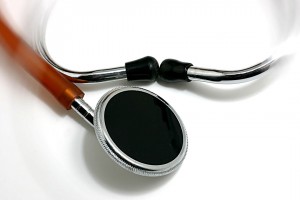 A couple of weeks ago, I accompanied a friend of mine to an appointment with her gastroenterologist. She has serious, chronic gut issues, and was meeting with him to discuss them. (She asked me to come along because I take good notes, might think of additional questions, and could more or less act as her advocate.)
A couple of weeks ago, I accompanied a friend of mine to an appointment with her gastroenterologist. She has serious, chronic gut issues, and was meeting with him to discuss them. (She asked me to come along because I take good notes, might think of additional questions, and could more or less act as her advocate.)
I liked her M.D. He was thoughtful, responsive, open to questions, and in general didn’t have the “I’m a doctor, therefore your questions are irrelevant, mere mortal” attitude that some physicians unfortunately have. (And he told her the surgery wouldn’t help her symptoms.) However, when I asked him about the possibility of testing her for leaky gut, he looked kindly at me and said, “Conventional medicine doesn’t believe in leaky gut.” I was dumbfounded. I’m nearing the end of a lengthy course of study with Hawthorn University, during which I’ve delved extensively into the physiology of the human body, and I distinctly remember learning about leaky gut syndrome. From a Ph.D. or two, no less.
So I ran the doctor’s statement by my instructor at Hawthorn, and she said that when speaking with conventional medical doctors, one needs to use different terminology: just say “intestinal permeability syndrome,” and they’ll get right on board. Figures. “Leaky gut” is just too, um, graphic, I guess, too easy to understand – so it’s gotta be some kooky alternative medicine thing, easily written off by those in the know.
Lest you, too, chalk up the experience – or the term – to my own susceptibility to alternative medicine foolishness, there is an excellent article that recently appeared in the New York Times Sunday magazine about the connection between inflammation and increased intestinal permeability (aka leaky gut). Sanford Newmark, a clinical professor at the Osher Center for Integrative Medicine at the University of California, San Francisco, is quoted in it: “A lot of doctors and people may think that leaky gut itself is sort of a froufrou alternative concept. The real name is ‘increased intestinal permeability,’ and it is a definitive, scientific fact.”
The article also mentions the Human Microbiome Project, the National Institutes of Health project working to list all the bacteria in our guts. Again, from the article, “What’s already clear is that changes in our bacterial populations are associated with changes in our health.”
This notion, that what happens in our gut has a profound influence on our overall health, is hardly new to holistic health practitioners and researchers. I like to think that the fact that it’s filtered into the mainstream, even a little bit, is hopeful. I’ll try not to be concerned that the next steps will be the patenting of our biome by one or more corporate ventures, or that probiotics will become prescription-only drugs. (Because I’d hate to be cynical about any of this, you know?)
In the meantime, this argues strongly in favor of not damaging the gut with foods to which one has a demonstrated sensitivity. A number of people have issues with gluten, dairy, corn, soy, or nuts, but there are other foods to which people can have reactions – not always immediate reactions, but delayed ones. Pay attention to your own unique body. It’s an interesting exercise to track your diet, your energy, and your mood for three days to a week, just to see what patterns can emerge.
It’s also a good idea to eat probiotic foods (kefir, sauerkraut, kosher dills, kombucha, and the like) every day. Every meal, even. Particularly if you’ve had one or more courses of antibiotics (and tell me someone who hasn’t), and have not consistently taken probiotics afterwards, probiotic foods can go a long way towards helping restore the integrity of your gut and a happy population of beneficial bacteria.
There are lots of other avenues to explore in this regard; more to come!

I need a gastroenterolist in my area that knows how to deal with leaky gut. I live in western Ky. Was diagnosed in Fl in march. No one hear knows anything about it.
Hi, Linda, You might check with your local Weston A. Price chapter leader (link: http://www.westonaprice.org/local-chapters/find-local-chapter#ky ) to see if they can refer you to a practitioner familiar with gut issues. You could also check out a few books from the library (or buy on Amazon) for greater understanding of the issue. Try Digestive Wellness by Elizabeth Lipski ( http://tinyurl.com/n425s28 ) and Gut and Psychology Syndrome by Natasha Campbell-McBride ( http://tinyurl.com/m6onomf ). You’re right, a lot of conventional docs don’t know much about this; we can only hope this changes soon. Good luck!